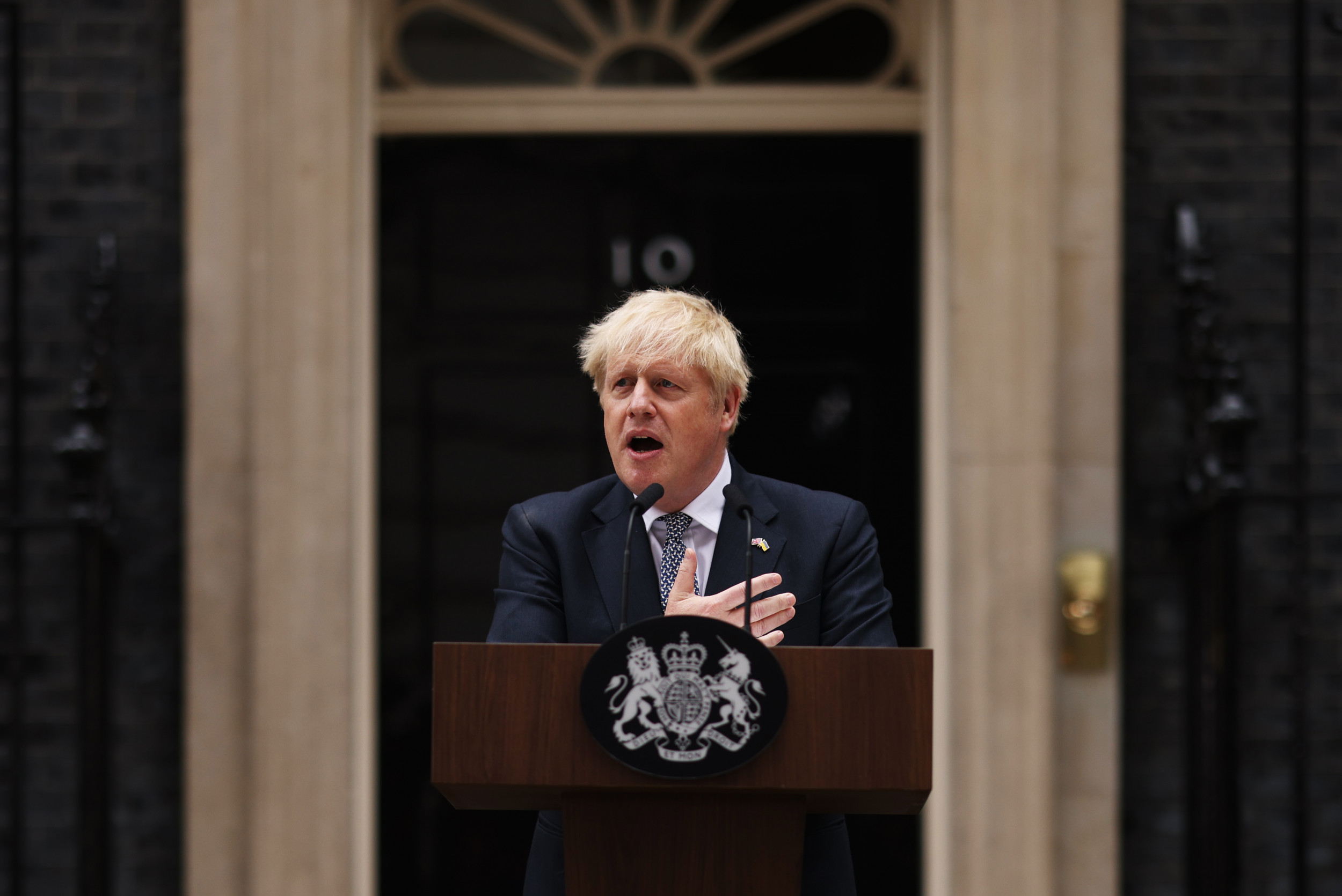“Does the panel think that Boris Johnson would make a better Boris Johnson than Boris Johnson?”
So go the words of a fake audience member in a parody of the BBC’s flagship “Question Time” show—which, for better or worse, has been one of the political staples of British television since before televisions existed.
The remarkable thing about this sketch, which is hilarious to Brits and should probably confound anyone else, is that over the course of three and a half minutes, Boris Johnson is the only politician actually named. The other subjects of Harry Enfield and Paul Whitehouse’s sketch include institutions such as the BBC, the British university system, and artist Tracy Emin.
So as to further impress you, the sketch was first aired in 2009, a full decade before Boris Johnson would become prime minister of the United Kingdom of Great Britain and Northern Ireland. In brief: Boris Johnson has been his own kind of British institution for quite some time, serving in Parliament from 2001, as London mayor from 2008, and foreign secretary from 2016. Three years later, he would become the country’s prime minister and deliver the Conservative Party its largest parliamentary majority since the days of Margaret Thatcher.
Even prior to his political career, he was an established columnist at The Times (of London), The Telegraph, and The Spectator. He’s practically political furniture in Britain, at this point—which is why it has been especially difficult for critics to remove him from the position he has routinely abused over the past several years.
Where should we start?
Straight out of the gates, Johnson was plagued by the kind of controversy he isn’t particularly good at deflecting: corruption scandals surrounding his then-lover Carrie Symonds (now Carrie Johnson), cronyism over government contracts during the pandemic, the breaking of his own COVID-19 rules, and a plethora of sex scandals.
Carrie—for American readers, imagine if Bill Clinton had married Monica Lewinsky—brought her own baggage to her new role as the prime minister’s wife: pushing friends into roles in government, pulling Boris far to the left on climate change and LGBT issues, and using taxpayer cash to refurbish the Downing Street apartment with wildly expensive furniture. (For the latter, I personally coined the nickname “Carrie Antoinette,” and I’m delighted to say it has stuck.)
But the real scandal around Boris Johnson was that he was just never who they claimed he was: a conservative.
My friends at the oldest conservative think tank in the world, The Bow Group, Have long argued that if Boris had appointed conservative ministers instead of center-leftists, took clear positions on ludicrous concepts such as the bankruptcy-inducing “net zero” carbon emissions policy, or even remotely tried to bring down the U.K.’s astronomical immigration levels, he would have had little problem hanging on to power. But Boris governed Britain like he governed London: as a small-l liberal who has far more in common with “woke” corporate types than with the small-c conservative and Brexit-voting Tory base that fell for his act.
Dan Kitwood/Getty Images
And here we are. Ding dong, the ding-dong is dead. (Though I suspect Ms. Antoinette has a “return to glory” already planned for her hubby.)
The more immediately pressing question is, what now?
Well, thanks to the quirks of the British constitution, the Conservative Party itself gets to choose a new leader, by its own rules, and that leader becomes the prime minister of the country. Such baton-passing is frowned upon by the public. But so are awkwardly timed elections. If the candidate looks and sounds enough the part, the Tories may get away with skirting a national plebiscite. If not, recent polling puts the Labour Party’s Keir Starmer in a decent position against potential Tory opponents such as Rishi Sunak and Sajid Javid, per Ipsos polling.
Former Chancellors Sunak and Javid could be expected to throw their moderate hats in the ring. Sunak voted for Brexit with the conviction of Britain emerging as a more, not less, globalist nation. Javid opposed Brexit entirely.
Their potential intra-party opponents include staunch Brexiteer Suella Braverman, libertarian squish Steve Baker, former Defense Secretary Penny Mordaunt, and perhaps one of the worst of the “big names” of all: the wildly socially liberal, anti-Brexit Liz Truss.
Add to those names a few regular runners like Grant Shapps, Jeremy Hunt, Nadhim Zahawi, and Priti Patel, and you already have a rather large and scrappy field. Which is what former British Army captain Ben Wallace—the current pro-Brexit, pro-Ukraine war defense secretary—may be hoping for. Less intent on seeking the limelight, a Wallace premiership would be a 180-degree contrast from the Johnson years. If he lined up a wide coalition of members of Parliament like Esther McVey, John Redwood, Tom Tugendhat, and Michael Gove behind him, Wallace could emerge as the steadiest option—for both the Tories and the U.K.
Alas, Tory members of Parliament, with Boris included and perhaps an exemplar, are renowned for their flip-flopping capabilities. Where they stood on any given issue yesterday has almost no bearing on where they might be tomorrow. Indeed, they’re often offended at even an expectation of consistency.
Still, I don’t believe Boris Johnson could make a better Boris Johnson than Boris Johnson, and I will continue to publicly urge him to never seek executive office again. In fact, the Conservative Party should (which means it won’t) use this as an opportunity to institute a real primary system for picking its next leader. From David Cameron to Theresa May to Boris Johnson and now onto the next, it’s clear the selection process is simply not working.
Unfortunately, corporate party bosses really do not enjoy the idea of the bloke in the back of the audience at the real BBC “Question Time” having a say in who leads the country. And that is why a decent Labour Party leader—so probably not Keir Starmer—would have a field day with most of this batch of Tories.
Raheem Kassam is the editor in chief of The National Pulse, a Lincoln Fellow at the Claremont Institute and a senior fellow at the Bow Group in London.
The views expressed in this article are the writer’s own.

















Discussion about this post